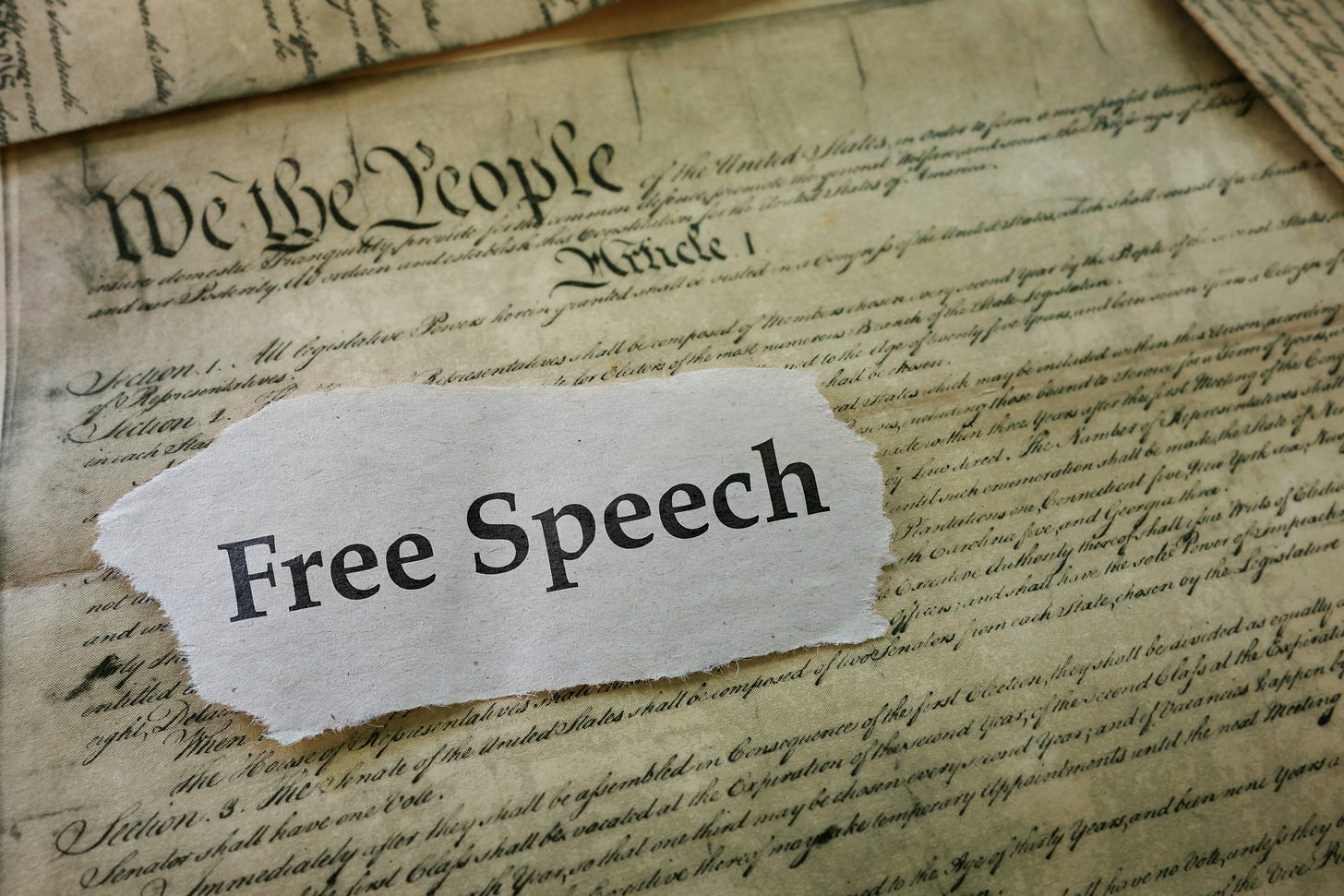E-Pluribus | May 19, 2021
Is John Stuart Mill culpable in cancel culture, the media meltdown, and why free speech is (almost) everything.
A round up of the latest and best writing and musings on the rise of illiberalism in the public discourse:
Robert Garmong: Where Did Liberalism Go Wrong?
If a poll were taken on who is the father of cancel culture, I daresay "John Stuart Mill” might rank fairly low among the responses. But Robert Garmong argues at Symposium that Mill’s philosophy went beyond that of other thinkers on the concept of liberty, helping to “break down the wall between the moral and the political” and opening the door to “wokeness” and other phenomena that demand the punishment of non-conformists rather than simple refutation.
To this point in the logic of Millian liberty, the political shifts were generally subsumed under the rubric of liberalism, but that logic eventually worked its way out in a break with the very notion of liberalism itself. This is the rise of avowedly illiberal “woke” culture, “cancel culture” (on both the left and the right), and the whole range of tribal identity politics.
Once one’s liberty is considered to be violated by social pressuring, every disagreement can be construed as a “microaggression,” every failure to announce one’s preferred pronouns can be seen as “moral coercion” against gender-nonconformists. “Hate speech” is viewed as a crime punishable by law, and even silence, the failure to affirm one’s support for a socially important cause, “acts like a weapon.”
And on the other side, every lapse in fealty toward the former president is condemned as “disenfranchising” his millions of supporters. A US senator loudly complains that a private company’s decision not to publish his book is censorship and violates the First Amendment (a complaint which is, of course, widely reported in the media).
Any supposed assault on one’s identity becomes, not a disagreement to be discussed rationally, but a violation of one’s liberty.
Moreover, it becomes imperative to punish supposed offenders, not merely argue with them. Just as it is a breach of justice for the government to let a proven criminal off the hook, so it is incumbent upon the tribal warriors to “cancel”—or worse—whoever has transgressed against them. If Barry Goldwater was right to say that “Extremism in the defense of liberty is no vice” and “[m]oderation in pursuit of justice is no virtue,” then, by the logic of Mill’s redefinition of liberty, cancel culture is only doing what it must. In other words, the new illiberalism of both the left and the right is a direct, logical outgrowth of the liberalism espoused by John Stuart Mill.
Read it all here.
Jesse Singal: Why the media is melting down
Jesse Singal, a self-described left-leaning journalist, writing at The Spectator, worries that mainstream journalism is following the trail already blazed by the right-wing media — that of activism. While the development of an activist mentality among mainstream journalists might sound like an observation coming decades too late, it’s worth listening to someone who considers left-leaning, mainstream journalism his “side.”
…The truth has traditionally been very important to journalism, but a larger and larger chunk of the overall media pie is dominated by partisan and hyperpartisan actors for whom it is a secondary concern. In my view, the right is much further down this road than the left. I vividly remember watching the latest unhinged rumor about Hillary Clinton race through far-right online networks in 2016 and being shocked at what fringe outlets would ‘report’. Pizzagate and QAnon and so many other utterly depraved conspiracy theories would not have caught on if the average conservative were swimming in epistemically healthy waters. More pressingly, the fact that according to a recent Reuters/Ipsos poll 55 percent of Republicans continue to believe Donald Trump won the election tells us something even more important — and grim — about how pathological that media ecosystem has become.
But the vast majority of mainstream outlets are left-leaning, and I’m worried that that side — my side, if I’m being honest — is starting to exhibit certain tendencies I’ve long associated with right-wing media. There is what feels like a heightened sense among many mainstream journalists (particularly younger ones) that they are not only observers but active participants in vital social-justice battles. Knowing this doesn’t require any dramatic leaks of internal chats, or anything like that — they’ll simply tell you. And this attitude leads directly to unjournalistic editorial decisions which degrade public trust in our institution.
[…]
Many of my fellow progressives argue that there’s really nothing to see here. These convulsions within media organizations are simply the result of historically underrepresented people asking to be respected, of a long overdue reckoning after a seeming eternity of white men dominating newsrooms. There’s a kernel of truth here — of course it is the case that until fairly recently, many groups were effectively shut out of media, and that any shift toward sensitivity and inclusivity will bring with it certain tensions — but that also misses the bigger picture. The meltdowns which have occurred in many major media outlets are mostly the result not of ‘traditional’ battles over equitable treatment, but reflect the rise of a very particular set of political, moral and causal claims that are draped in this language but go well beyond it.
Read the whole thing.
Jonathan Zimmerman: Why Free Speech?
“Sticks and stones may break my bones, but words will never hurt me” is a schoolyard retort that many would do well to take to heart in the current climate. Any honest individual will admit that words can indeed hurt, but citizens in a liberal society must recognize that trying to stop others from saying hurtful words hurts everyone in the long run. Jonathan Zimmerman shares some anecdotes and plugs his new book at Heterodox Academy.
A few years ago, I invited Mary Beth Tinker to meet with my undergraduate class on the history of American education. Tinker herself is an important figure in that history, because she was one of the students who wore black armbands to school in Des Moines, Iowa, in 1965 to protest America’s involvement in the Vietnam War. Sent home as a punishment, she sued her school district on free-speech grounds. Tinker v. Des Moines made its way to the Supreme Court, which ruled in her favor in 1969. In a ringing decision, the Court declared that neither students nor teachers need to “shed their constitutional rights to freedom of speech or expression at the schoolhouse gate.”
[…]
But when our class discussion turned to the present, the mood changed. Students insisted that schools and universities should prohibit hate speech, which hurts innocent people. Mary Beth Tinker was fighting the good fight, against the war in Vietnam. But racists and sexists and homophobes and transphobes are different, my students said. They cause harm, offense, and even trauma in their victims. We need to shut them down.
Tinker wasn’t having it. At her middle school in Des Moines, she said, there were students who had fathers, uncles, and brothers who were fighting in Southeast Asia. Don’t you think they were offended and hurt by a snot-nosed kid whose armband suggested that their loved ones were risking their lives for a lie?
Of course they were. Speech hurts, which is why censors across time have tried to stamp it out. So if you’re going to bar speech that hurts someone, well, forget about Tinker’s armband. Forget about free speech, period.
[…]
Mary Beth Tinker wasn’t having that, either. In 1965, she told the class, she was a 13-year-old girl. Free speech was the only power she had! Take that away, and she would have nothing at all.
Read it all here.
Around Twitter:
Things are heating up across the pond with COVID and individual liberty issues:
The New York Times finds Apple is knuckling under to Chinese demands for more control over security and privacy safeguards.
Chicago mayor has instituted a “black and brown” interviewers only policy.
Not everyone is on board with the new policy:















